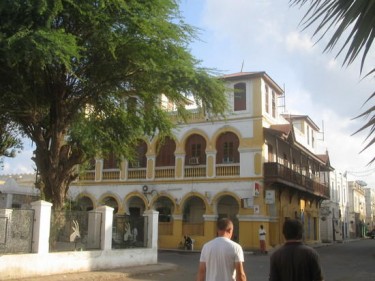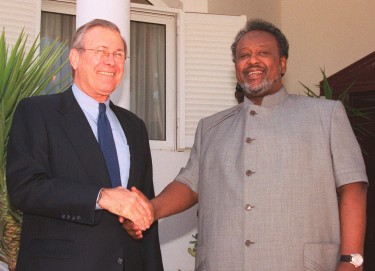Several opposition leaders were arrested [fr] in Djibouti, a small, but strategically important country in the Horn of Africa, after demonstrations which followed the February 22, 2013 general elections. The elections saw yet another victory for the party in power, the People's Rally for Progress. President Ismail Omar Guelleh, who has ruled since 1999, received 80% of votes cast, leading to allegations of fraud on a massive scale. The arrests followed the demonstrations about allegations of massive fraud [fr]. According to the Djiboutian League of Human Rights organisation and the International Federation of Human Rights, 90 people were retained in the famously tough Gabode Central Prison. Arrests were still continuing at the time of writing, April 2013.
Spokesperson for opposition party Union for National Salvation, Daher Ahmed Farah, was sentenced [fr] to two months in the same closed prison for calling for rebellion after the election results were announced. The following video shows fighting in the streets between opposition demonstrators and the police (via Dillipress):
Elections in Djibouti have still not resulted in a real political alternative for power. Ismaïl Omar Gelleh has been president of the republic since April 9, 1999, and his ideologically conservative party, the People's Rally for Progress, has been in power since the country gained independence.
James Schneider from Think Africa Press has always believed that the elections only gave the appearance of democracy:
His most recent re-election, in 2011, came after he changed the constitution to be allowed to run for a third time; the vote took place without election observers and Guelleh won practically unopposed after the opposition withdrew citing harassment and the unfair nature of the poll [..] Guelleh’s illusion will have worked, at least in the short term: he will still have power but now with the veneer of a parliamentary opposition. Indeed, many people have much to gain from the electoral illusion. But sadly, this group is unlikely to include most ordinary Djiboutians. After all, you cannot improve freedom, development and wellbeing with illusions alone.
The party in power is contesting these allegations of fraud. Abdi Ismail Hersi, head of the independent National Electoral Commission, has stated that the elections took place in a transparent manner. This verdict was shared by a Malian commentator from the African Union, Cissé Mariam Kaïdama Sidibé, who stated:
The citizens of Djibouti were able to carry out their civic duties in total transparency.
On its facebook page [fr], the opposition party reported that arrests [fr] of opposition members were still continuing in the city of Arhiba:
A Arhiba, la journée du dimanche 7 avril a vu l'arrestation musclée avec force brutalité d'Abdo Mohamed Ahmed et Houssein Mohamed Kamil avant d’être conduits tous deux au centre de Nagad. Puis c’est vers 2 heures du matin dans la nuit du dimanche 7 au lundi 8 avril que la police a procédé à de nouvelles arrestations directement aux domiciles des individus pour tirer de leurs lits au moins trois hommes dont les noms ont été révélés : Abdo Ibrahim Mohamed, Abdo Ali Bouha et Abbatte Gadid Merito.
The strategic position of this country in the Horn of Africa makes Djibouti a significant ally for Western countries including France, its previous colonial power, in the fight against the pirates and Islamic terrorists of the region.
Luke Lythgoe of Think Africa Press explained how this background makes it difficult for Western countries to criticise the current government:
Djibouti may be a country few in the West know about, yet Western foreign policymakers have placed disproportionate emphasis upon the tiny nation as a strategic base for their operations in the Horn of Africa – particularly in combating piracy and the militant Islamists al-Shabaab in Somalia. Perhaps understandably, considering the higher profile crises on its doorstep, the West has treated Djibouti as little more than a tool in its arsenal – as a military base, launch pad for drone strikes, or venue for regional diplomacy – rather than a situation worth addressing in its own right.









1 comment